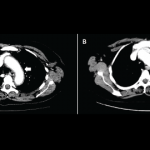In severe cases, conventional synthetic disease-modifying anti-rheumatic drugs (csDMARDs) in addition to TNF inhibitors may be necessary. Shared decision making—among the patient, oncologist and rheumatologist—is crucial to successful treatment. Although csDMARDs have less inherent risk of tumor progression and potential to interfere with immunotherapy, their onset of action is slow. In contrast, and although not approved for this indication, TNF inhibitors may be considered in some circumstances to reduce inflammatory symptoms and improve quality of life more quickly, particularly for patients with lack of response to the ICI, those who have truncated life expectancies, and in patients who do not respond to csDMARDs and/or require prolonged higher dose corticosteroids.
Moreover, there is experience using TNF inhibitors to treat other irAEs, including colitis.26 Recent large observational studies have demonstrated that TNF inhibitors are not associated with increased risk of de novo melanoma and lymphoma development when used to treat inflammatory arthritis.27,28 Little is known, however, about the long-term effects of irAE treatment in patients with advanced cancer. The risk for tumor propagation or impaired cancer response is theoretically possible with biologic agents, such as TNF inhibitors and abatacept.25
It’s important to note that little research exists analyzing use of ICIs in patients with preexisting autoimmune disease because these patients were excluded from original trials. However, preexisting autoimmune diseases should not be an absolute contraindication to ICIs. A careful assessment of disease activity is important prior to starting immunotherapy because of the risk of potential flare.
In a study of 52 patients with autoimmune disease treated with ipilimumab, 20 (38%) had a flare of their disease, including seven of 13 with rheumatoid arthritis, three of three with polymyalgia rheumatica, two of two with Sjögren’s syndrome and three of eight with psoriasis.29 Flares tended to occur in those taking immunosuppressive therapy and with evidence of ongoing autoimmune disease activity at the time of ICI initiation. Only two patients (4%) discontinued their ICI due to severe flare.
irAEs from ICIs are increasingly recognized as unique entities mimicking traditional rheumatic diseases.
Similarly, in a study of 30 patients who received ipilimumab for advanced melanoma with preexisting autoimmune disease (including six patients with RA, five patients with psoriasis, two patients with lupus), half had neither autoimmune flares nor new irAEs.30 However, 10 patients (33%) experienced moderate to severe irAEs; all were successfully treated with corticosteroids. In most cases, disease flares were managed with low-dose corticosteroids ranging from 5 to 30 mg daily. One patient with RA developed severe joint pains after ICI treatment with concurrent hypophysitis and required IV methylprednisolone at 1 mg/kg/day. Infliximab was used to treat two cases of colitis that arose in one patient with preexisting ulcerative colitis and one patient with inflammatory arthritis.
Conclusion
Cancer therapy is rapidly evolving, and manipulating the immune system plays a critical role. The rheumatologist will be faced with new clinical entities, mimicking common autoimmune diseases, and will need to be prepared to rapidly diagnose and treat these irAEs. Preexisting autoimmune diseases were theoretically felt to be a contraindication for use of ICIs, but observational studies have shown successful use in these patients. Early recognition and treatment of these immunologic adverse events will allow for improved outcomes and quality of life for patients previously faced with rapidly fatal disease. Steroids are a mainstay of therapy for the treatment of arthritis, potentially used at higher doses than is typical and for an extended duration. If clinical response is not achieved, csDMARDs and TNF inhibitors may be necessary. Management decisions should always be made in concert with the oncologist.



